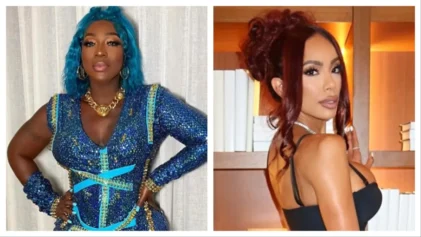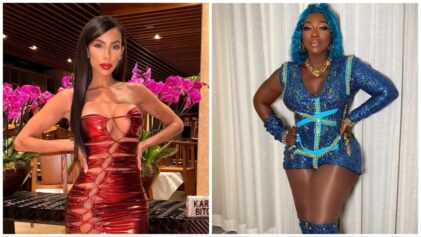Dancehall artist Spice is not new to the game, but she’s finally getting her due in the U.S. With the upcoming release of her first studio album, a spot in the “Love and Hip-Hop: Atlanta” cast and a social issue that she stopped feeds to bring attention to, she’s already showing American fans that she knows how to make waves and isn’t planning on stopping any time soon.
The Queen of Dancehall is preparing for the release of her first studio album, “TEN” on July 30, she spoke with Atlanta Black Star about her upcoming “Good Morning America” performance with Sean Paul and Shaggy, the latter of whom also executive produced “TEN.”
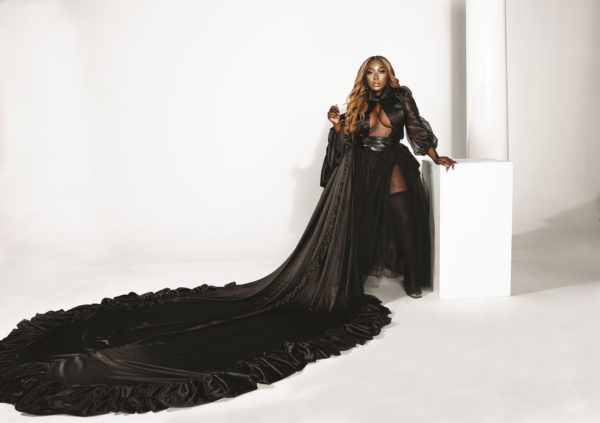
Spice’s “GMA” June 11 appearance will mark a personal and career milestone for the artist. The trio will perform “Go Down Deh,” a single from her album, and not only is it her first time on the national morning show, she will also be the first female dancehall artist to perform live on the “GMA” stage since its 1975 premiere.
“Being a part of ‘Good Morning America’ is … a great accomplish accomplishment and I’m humbled by it,” she told us. “I just feel elated as well to know that I will be going on ‘Good Morning America’ for the first time, and the first female dancehall artist to be going on it, but I’m going on it with two legends, two icons, I don’t take that for granted at all. So big up to Sean Paul and Shaggy, I know we’re going to do amazing.”
The “Pay For It” artist had nothing but positive things to say about her experience working with fellow industry vet and friend Shaggy. The work felt more like play while the two of them created together, and the two ended up walking away with a record they can both be proud of, in addition to feeling even more “like family.”
“Working with Shaggy has been amazing, I keep telling people, ‘Shaggy’s like family.’ I feel like he’s just my friend, it’s not work for me, it’s just having fun. We chat and laugh in a studio all the time, it’s nothing, no tension, no vibe, it’s just easygoing days, I don’t feel like it’s work.”
“Shout out to Shaggy’s wife, Rebecca as well, we’d have a relationship throughout the past years, their daughter and my daughter shared the same class in schools, so we’ve always been parents at PTA, so it’s like a family bond to me, and I have great amounts of respect for Shaggy and his entire family.”
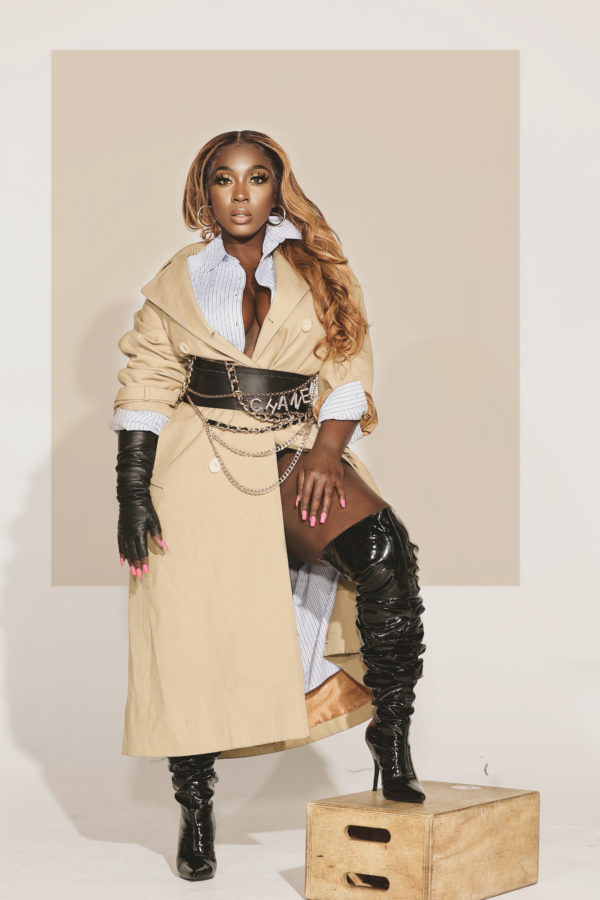
Fans can expect the same turn-up music that they can dutty wine to when they listen to “TEN,” but Spice has a little something new in store for the people too. “I’m going to showcase different sides of me as well, that I’m super excited and can’t wait for them to see,” she teased. “My growth and the vision of just moving forward and branding myself in a different area and stuff like that, so I’m super excited for [the fans], I think they’re going to be extremely happy.”
Spice’s career began in the early 2000s, and through talent and consistency she’s been etched her place as one of Jamaica’s most popular dancehall artists. Her transition to the American market has progressed a bit slower but is turning a corner, thanks in part to her “Love and Hip-Hop: Atlanta” appearances. “One of the main reasons why I decided to be a part of the ‘Love & Hip Hop’ franchise as well, was to expand my brand,” she said. “A lot of people, when I went there, they were like, ‘Oh, but Spice is already huge.’ But they don’t realize that there’s so many more room for growth with [the] brand. And so being a part of that franchise was a whole powerhouse movement to expand my brand and to get more fans in the American world.”
The decision ended up being the right one for her in the long run, however, if she could go back and do it all over again, she admits one thing she would change would be the company she keeps. “I must say being a part of the ‘Love & Hip Hop’ franchise has catapulted my career internationally, I can’t deny that…I would make the same decision again, to be a part of ‘Love & Hip Hop,’ but the decisions that I would [change] was the friends that I’ve mixed…I would have chose to meet some different people and some different friends along the way, or along the journey.”
Spice’s controversial 2018 social media post depicting her with much lighter skin and blond hair was made with the intent of drawing awareness to the issue of colorism within the Black community. The subject is a close one to her, because as a dark-skinned woman she’s been personally affected by the prejudice. “I used to face things like, people used to comment, ‘Why I don’t bleach?’ ‘Why I have so much money and I’m not a lighter shade?’ I used to hear all of that and I’m like, ‘Hold up, so you’re trying to tell me that I can’t make it being successful as a dark skin, Black woman?”
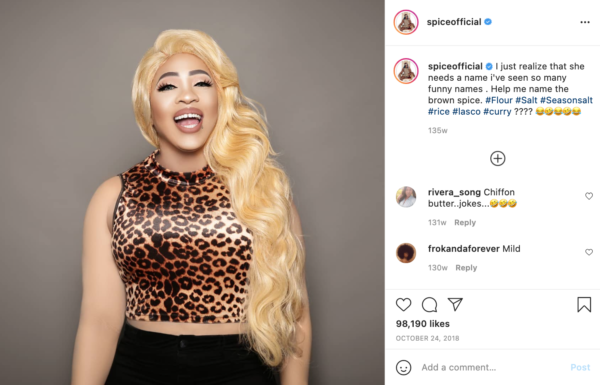
The photo initially drew criticism and confusion as fans wondered whether she’d really altered her appearance so drastically. The “Frenz” artist eventually revealed the stunt was all promotional material for her single “Black Hypocrisy” and, as she put it, “my way of protesting.”
“I felt like I had to stand up and do something for dark-skin Black women, because I feel like we get a lot of criticism and hate from our own race for no reason,” she told us. “My way of doing it was, I use makeup to appear to be lighter and I did that because, it was just a way to create awareness to colorism because I knew that when I did that, I would have the world’s undivided attention. I know that everybody would stop and look at it so that I could get my message across. Now, back in the days, people used to protest and print up cards, and that was their way of protesting, that was my way of protesting.”
The confident 38-year-old performer that we see today is the result of a self-love journey that growing up in Jamaica didn’t make easy on her. While she wouldn’t change her skin tone today for anyone, Spice revealed that she hasn’t always felt that all shades of Black are beautiful.
“I didn’t feel this way when I was going to school, because I was younger and I was led to believe that I had to be lighter because of the things that I used to hear as a young girl growing up. ‘Brownin’ is what they call the lighter girls here in Jamaica, so it was always a brownin’ thing. … So I’m like, ‘OK, so where do I fit in?’ That’s how I used to feel being in Jamaica, because everybody bleach here — not everybody, but most people, I should say, bleach their skin here. It’s like a trend. They do it like a trend.”
While she does feel like there is growing rejection of colorism among Black people in the years since her “Black Hypocrisy” release, Spice hasn’t let up on her objective to continue raising awareness. When Meghan Markle opened up to Oprah in March about the racism and discrimination she faced from the British royal family and tabloids while living in the UK, Spice commented on The Shade Room’s post about the interview “Imagine these words coming from Meghan who’s a lighter shade than I am and you can only imagine what I went through.”
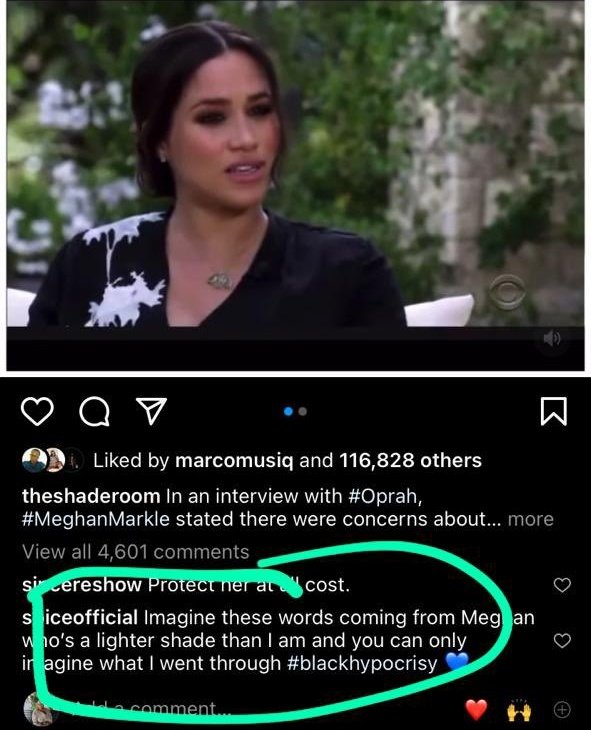
The comment drew mixed reactions, with some fans disagreeing, while her point resonated with others. Regardless, Spice felt that the sentiment was necessary and stands behind her thoughts. “I didn’t go back and look at the responses, to be honest, but I probably heard one or two conversations about Black women being just Black women, and it’s different,” she stated.
“When you have a darker skin tone, you go through more, than when you have a lighter skin tone, and that’s my opinion and my views because I can’t speak for you or someone else, but I have to speak on what I know and what I’ve been experiencing, and that’s what I know for a fact,” she continued. “It doesn’t matter if you’re a Black woman, but when you are a Black woman with a darker skin tone or a darker complexion, it’s much more harder for you.”
Spice hopes that through using her platform to speak out against colorism, she’ll do her part to help the community put an end to the issue. “I think the key to ending it is spreading love, spreading love to each other, supporting each other.”
As the United States continues to catch on to the superstar that Jamaica has known about for decades, Spice already has her mind made up about the legacy she wants to leave in the industry. “I want to be remembered as the Black woman who made it despite all the fights, despite all the odds. I want to be remembered as a strong Black woman, the lady that wore many hats, a single mother, because women go through that as well, and they feel like they can’t do it without support from someone else, and I showed them that, ‘Listen, you got to do what you have to do.’ So I want to be remembered as a strong Black woman, a good entertainer who was filled with fun and love and excitement, because that’s what I distribute in my music.”
